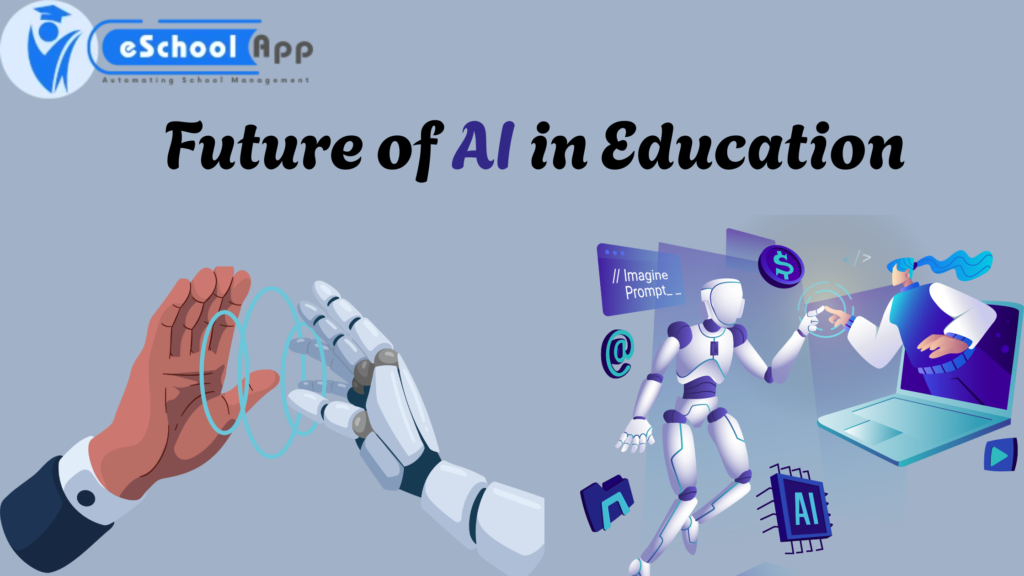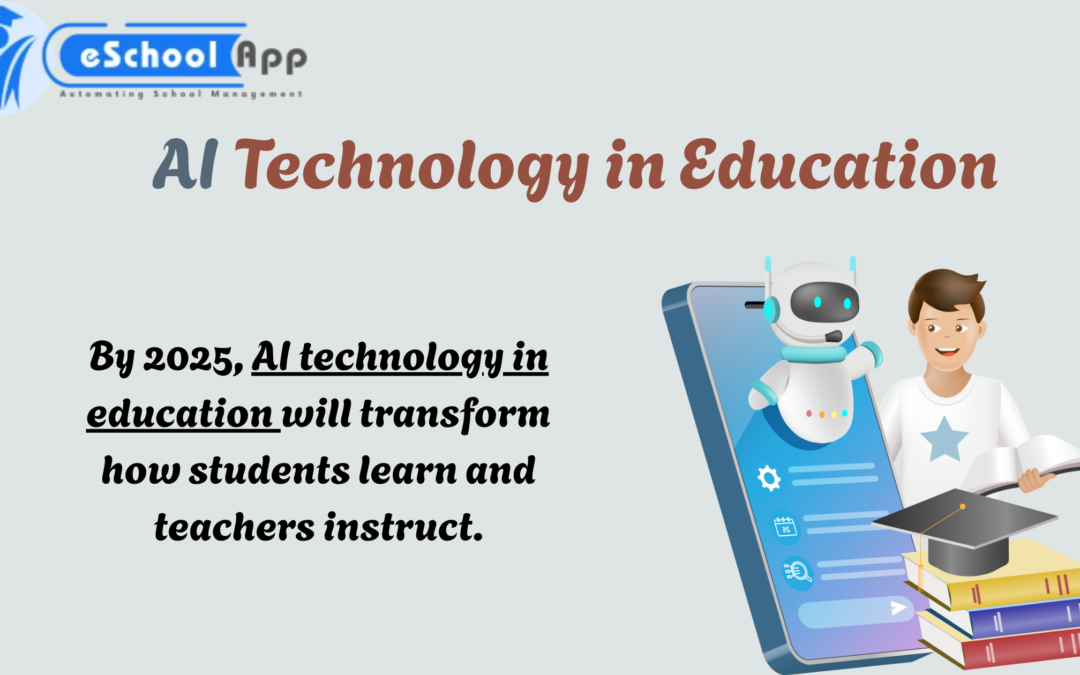Author: Sapna K
Have you ever considered that a robot could help you with your homework? A smart computer that knows what you have to know the next time around? It’s no longer a fantasy. By 2025, AI technology in education will transform how students learn and teachers instruct.
Let’s look at the ways Artificial Intelligence (AI) is making classrooms and schools smarter, more efficient, and faster.
1. 📚 Personalized Learning for Every Student
A single of the thrilling applications of AI in education is personalization of learning.
AI tools can be:
- Learn what students know and what they may need assistance with.
- Provide exercises and lessons that are appropriate for the student’s stage.
- Making learning more efficient and enjoyable.
For instance, when a student excels at math but has trouble with English For instance, the AI could focus on enhancing their English. This allows every child to develop at their own pace.
2. 👩🏫 Helping Teachers Save Time
Teachers face many tasks to complete: making lesson plans, checking homework, and addressing students with questions. AI helps with certain of these tasks in a way that is automated.
AI used in classrooms:
- Test papers, and then give immediate marks.
- Answer questions from students by using chatbots.
- Help teachers prepare better lessons.
Teachers can concentrate on each student and to teach with attention to each student.
3. 🎯 Smart School Management
Modern schools aren’t only about blackboards and books. They also require sophisticated systems that can manage everything from exams to attendance.
With AI tools for education, schools can:
- Track the students’ attendance and their performance.
- Updates are sent automatically to parents.
- Control timetables and exam dates easily.
Here at eSchoolApp At eSchoolApp, we employ AI to help schools manage their operations in a way that is simple and efficient.
4. 🤖 Virtual Tutors and Chatbots
Not all students can have questions for their teacher constantly. This is where AI-powered virtual tutors can help.
These clever tools:
- Answer students’ questions 24/7.
- Define topics clearly and simply.
- Test your understanding with practice tests. Your understanding.
This is especially beneficial to students studying from the comfort of their homes or in rural areas.
5. 🌍 Making Education Accessible to All
Many children across the globe can’t attend school because of distance, financial or any other issue. The importance of AI in education lies in the fact that AI provides education to all.
AI allows students to: AI students can:
- Learn with tablets or mobile phones.
- Get help in different languages.
- You can study at any time and from any location.
Students in smaller villages can study the same way as those in large cities.
6. 📊 Predicting Student Performance
AI is also excellent at looking over data and making intelligent predictions. Schools can utilize this technology to assist students in catching up before they get behind.
Utilizing AI technology in education, schools can:
- Find students who might need assistance.
- Learn why a student is not achieving very well.
- Support for planning before tests.
This will help every student achieve and remain confident.
7. 🔒 Safe and Secure Learning
AI is not just used for learning. It also helps keep students secure.
AI systems are able to:
- Monitor online classes to prevent bullying.
- Block harmful content.
- Protect student data.
It is believed that the future of AI in education will not only be smart but also secure.
💡 The Advantages of AI in Education
Here’s a quick overview of the main advantages of AI in education :
| Advantage | How It Benefits |
| Personalized Learning | It adapts to the needs of each student |
| Accelerate Grading | It saves time for teachers. |
| 24/7 Learning | Students can study at any time |
| Smart School Management | Easier admin work for schools |
| Early Support | Students are helped in the event of a failure |
| Safe Environment | Students are protected on the internet |
📌 The Future of AI in Education

In 2025 and beyond by 2025 and beyond, the future of AI in education appears very bright. With intelligent applications, virtual classes, and powerful data tools, education is expected to become:
- Easier
- Faster
- More excitement
Companies such as eSchoolApp have been developing AI-powered solutions that aid schools in becoming smarter.
✅ Real-Life Example: How eSchoolApp Uses AI
eSchoolApp, one of India’s most popular educational management tools, makes use of AI tools for education to:
- Predict trends in attendance
- Automatically send homework reminders
- Generate student performance reports
- Chatbot support for parents and students.
We do this to can help schools cut down on time and increase the quality of their education.
🧠 Why Is AI Important in Education?
Let’s look at the importance of AI in education through a simple illustration.
Imagine a child that is shy and does not ask questions during class. Teachers might not even notice that the student has difficulty. However, an AI system can monitor their progress, pinpoint the problem, and offer additional assistance, without asking!
This is why AI is vital – it can see what humans may overlook.
🎓 What Students, Teachers & Parents Say
👧 “I enjoy that the AI tutor is there to help me with maths when my teacher is not there. ” Student from Delhi
👩🏫 “I find myself with more free time now to assist my students emotionally and in a creative way. ” A teacher from Mumbai
👨👩👧 “eSchoolApp provides us with daily updates on our child’s performance. We feel involved. ” An Indian parent living in Bengaluru
🌱 Final Thoughts
AI is not designed to replace schools or teachers. It’s here to support. With the appropriate technology, AI can make learning more personalized, intelligent, and enjoyable for every student.
We at eSchoolApp We at eSchoolApp believe in harnessing AI’s power to improve education for students, one at an time.
📖 Summary Table: 7 Ways AI Is Transforming Education
| No. | How AI Can Help | Simple Benefit |
| 1 | Personalized Learning | Find out what you require |
| 2 | Teacher Assistance | It helps them save time. |
| 3 | School Management | Keeps the school organized |
| 4 | Virtual Tutors | Accessible at any time |
| 5 | Accessible Learning | Learn anywhere |
| 6 | Performance Monitoring | Helps before problems grow |
| 7 | Safety Tools | Learner safety is maintained |
❓ Frequently Asked Questions (FAQs)
1. What is AI in education?
Ans: AI in education is the use of intelligent computer programs that aid students in learning and aid teachers in teaching more efficiently. AI can provide individual lessons, help with homework, and interact with students as an instructor.
2. How is AI technology used in schools?
Ans: AI technology is utilized to record attendance, monitor the progress of students, aid students with homework, and coordinate schoolwork. Teachers also need to save time by examining the results of tests and planning lessons.
3. Why is AI important in education?
Ans: AI is essential because it allows each student to discover their style of learning. It determines where students require assistance and provides them with the necessary assistance. It also makes school and teaching work more efficient and quicker.
4. What are the benefits of using AI in education?
Ans: A few of the major benefits of AI in the field of education are:
- Individualized learning
- Rapid feedback for students
- Teachers’ support
- Easy school management
Learn anytime, anyplace.
5. Can AI replace teachers in the future?
Ans: It’s not true, AI cannot replace teachers. It can only assist them. AI can perform simple tasks, but instructors provide emotions of support and encouragement and care, things that AI can’t do.
6. What are some AI tools used in education today?
Ans: Common AI tools are:
Online tutors who can help students at any time
Chatbots can answer questions
Smart apps that offer suggestions for subjects for learning
Software that helps to verify assignments
7. What is the future of AI in education?
Ans: The potential of AI in education looks promising. AI can help students learn more personally and assist students with special needs, and aid in the smooth running of schools. AI will also make learning more enjoyable and accessible for all children.

